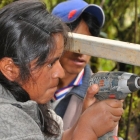Political Culture in Nigeria
Good Governance and Human Rights Groups (GGHRG), Cross River State, Nigeria
(A Break Through Initiative Group Created and Formed by One Sky Canada)
By Akamo Etim Okon
The above BI consist of six members drawn from various NGOs working currently in Nigeria, who participate in One Sky’s Leading From Within programme on integral leadership. The BI members have observed the unrepresented democracy in Nigeria especially in Calabar’s municipal council in Cross River State. The group sees the need of initiating a new concept known as the stakeholders dialogue, a forum for bridging the gap between the elected representatives and the electorates which has never existed in Nigeria. The project took a new direction, which had a media publicity in Cross River State as an activity, and included advocacy /orientation visits to ten council wards in Calabar municipality. Over two hundred (200) citizens in the wards were sensitized on the new concept of stakesholders dialogue, which was appreciated by all. Posters featuring the activities of the BI were used in the first pilot ward for effective awareness creation and mobilization of members in the ward. The BI group also paid a courtesy visit to the councilor of the pilot ward and also organized a stakeholder forum for the implementation of the project. More, there is a plan to visit the leader of the legislative chambers next week. On the aggregate, the concept was welcomed by all the councilors and next week Tuesday has been scheduled to meet them after their session to her better from the group and their unprecedented unique concept.
Thanks,
Akamo Etim Okon (member)
Background on the Political Scene in Nigeria...
Nigeria is ranked number 124 on the Economists Democracy Index out of 167 countries. On the one hand, it supposedly functions as a democracy, yet when assessed on the specific criteria for a democratic system, it is actually categorized as an “authoritarian” state (according to the 2008 Democracy Index). Extremely excessive corruption continues to constitute a major challenge to Nigeria, and vote rigging and other means of coercion are practiced by all major parties in order to remain competitive. Given its lucrative oil wealth, perhaps one of the central flaws of the democratic system is prebendalism. Prebendalism was a term first used in reference to Nigeria, in which elected officials, government workers, and members of the ethnic and religious groups feel they have a right to a share of government revenues. In other words, the political elite skims money from the state coffers feeling a sense of entitlement due to their position of power.
What does this actually mean for the people who live there? Well, Oxford's Paul Collier (2007, p 101) explains how the country has made approximately 280 billion dollars in oil revenue over the past 30 years, and yet on the Human Development Index the country remains 158 out of 182, with over half of the population living on less than $2/day. He explains, “This is far larger than any realistic scale of aid to a bottom billion country. Yet Nigeria has depressingly little to show for it.”
In this context, the breakthrough initiative described by Etim Akamo plays an incredibly important role in supporting an informed and empowered civil society. The role of political culture in an emerging democracy is vital. It helps to facilitate a more informed, aware citizenry, who make better voting choices, participate in politics, and hold government accountable.
Comments
Be the first to comment on this story. Use the form below.

